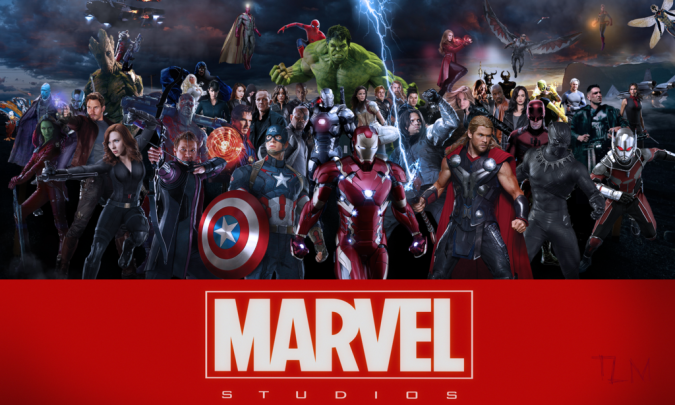
Back in 2008, Marvel took a chance and released an adaptation of Iron Man starring Robert Downey Jr. in the lead role.
Here’s a few reasons why this was a gamble:
- Marvel Studios (the first major independent film studio in years) took out a $500 million plus line of credit to produce these films
- Robert Downey Jr. was rebuilding his career after a string of personal troubles, but had not reclaimed the star power he once had
- Kevin Feige, then second-in-command at Marvel Studios, had a radical idea to interconnect future films in a way that hadn’t been done before
As we all know, Iron Man was released in May 2008 to fanfare from fanboys and praise from critics. The quality of the film was lauded by critics (considering the flops of X-Men: The Last Stand and Spider-Man 3 earlier).
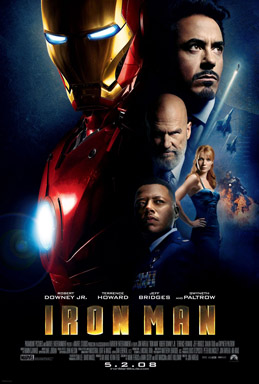
The film that started it all. Credit: Paramount/Marvel.
And cinematic history was being made.
A month later, the second film version of The Incredible Hulk was released to slightly warmer reviews than Ang Lee’s 2003 take on the smashing powerhouse. While the film seemed to be standard superhero fare, it was Robert Downey Jr.’s appearance as Tony Stark at the end of the film that proved to be the real game changer.
For the first time, a character from one series of Marvel films appeared in another Marvel character’s film. Marvel fans had wanted a crossover between Fox’s X-Men series with Sam Raimi’s Spider-Man but complicated studio rights and competition all but made that idea laughable. Marvel was able to accomplish this crossover, just as their comics had done so many decades earlier.
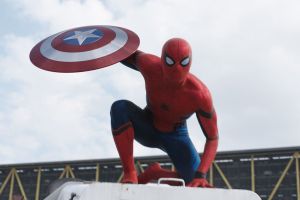
Spidey’s historic entrance in Captain America: Civil War. Credit: Marvel.
Now, we’re coming up on 10 years and 17 films later, and the Marvel Cinematic Universe has kept its interconnected series of superhero films going strong. The company continues to make cinematic history, in 2015 reaching a deal with Sony to share the film rights of Spider-Man, allowing the wall-crawler to join his compatriots in 2016’s Captain America: Civil War.
Marvel’s impact on the film industry is made, for better or worse, and their reach can be seen by examining the business practices of other film studios.
DC Comics was in a similar situation as Marvel: Batman proved to be their most successful superhero for the big screen, but the films of the 1990s hardly fit together in a cohesive story, and Christopher Nolan’s mid-2000s trilogy was a dark, but successful, take on the caped crusader. But he was about it.
A Superman film was released in 2006, but didn’t take off like DC or Warner Bros. had hoped. With the Dark Knight film series ending in 2012, the companies felt that they needed to follow in Marvel’s steps and begin to lay the groundwork for their own cinematic universe for their comic heroes to exist in.
In 2013, Man of Steel was released to reboot the Superman character, and begin to establish a DC cinematic universe (unofficially dubbed the DC Extended Universe). In 2016, a crossover film, Batman v. Superman: Dawn of Justice was released to reboot the Batman character and lay the groundwork for the Justice League crossover film, which would function similar to Marvel’s Avgeners films. This 2016 film also gave us an updated film version of Wonder Woman. Gal Gadot’s portrayal of the Amazonian princess proved to be the highlight of the otherwise shaky film. While the theatrical version of the film failed to live up to the hype, the extended Ultimate Edition of the film was a bigger hit with audiences. DC followed up with a Wonder Woman origin story film in 2017, which shattered all expectation for the DC film.
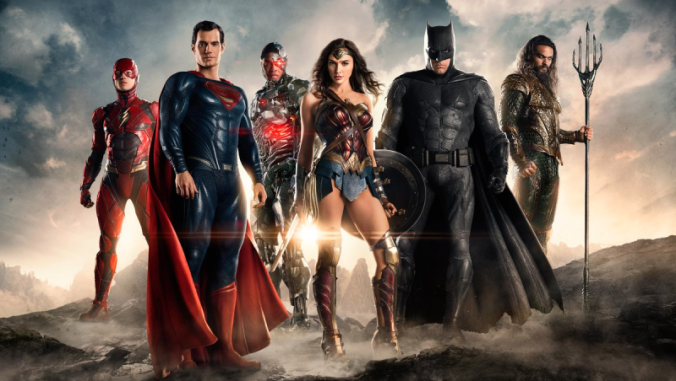
DC’s upcoming Justice League.
Meanwhile, DC had also launched several successful television shows based on their characters. Arrow, the Flash, and Legends of Tomorrow were released on the CW in a shared universe of their own; Supergirl premiered on CBS; and Gotham is a gritty take on a pre-Batman Gotham City.
Marvel’s groundbreaking business model of using its IP to create an interconnected series of films and TV shows was a good model for DC to follow (even if the company has not connected their series like Marvel has), but other studios were looking at how to take trilogies and turn them into multi-movie franchises.
And many of them have (tried), producing a long line of films and successors and sequels and prequels and spinoff films to get every last dime out of their properties.
- Paramount has Transformers, having just released their fifth film in the franchise.
- Disney recently added two sequels to their Pirates of the Caribbean series, also bringing the total number of films to five.
- Legendary Entertainment released a reimaging of Godzilla in 2014, and followed up with Kong: Skull Island, a King Kong reboot, in 2017, intending to make a “MonsterVerse” of films.
- Warner Bros. bought the film rights to J.K. Rowling’s Fantastic Beasts and Where to Find Them series as a follow-up prequel series to the Harry Potter phenomenon.
- Warner Bros. also commissioned the three-part Hobbit film series, serving as a forerunner to the Lord of the Rings trilogy from the early 2000s.
- Fox rebooted their X-Men franchise in 2011 with First Class, serving as a soft-reboot in the form of introducing the idea of alternate timelines to the superhero franchise. The company has also released a string of spinoff films focusing on Wolverine, portrayed by Hugh Jackman for a staggering 17 years.
- Disney’s acquisition of Lucasfilm in 2012 saw the revival of the beloved space saga with a new sequel trilogy being kicked off in 2015, and a series of spinoff films launched in 2016 with Rogue One.
- In 2017, Universal released The Mummy, a reboot of the late-1990s film, intending to reboot several of their classic monster movies from the mid-20th century in a shared cinematic universe.
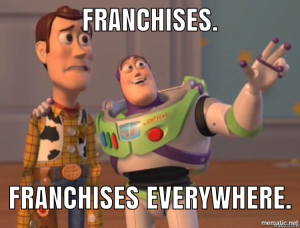
Basically, every studio wants a piece of the action in this “shared universe” business.
But it’s hard to argue that any of them have been as successful as Marvel has.
Kevin Feige’s ambitious plan (which resulted in him being named President of Marvel Studios and reporting directly to Disney CEO Bob Iger) has fundamentally changed the way film studios approach properties. Certainly, a creative idea which allows for iteration upon iteration, sequel after sequel after spinoff after prequel, to be produced is appealing to every studio executive.
But Marvel’s properties lend themselves exceptionally well to this cinematic universe set-up for a reason most of the aforementioned properties do not: the Marvel superheroes have always been interconnected, even back in the 1960s comic book series. Spider-Man was a close friend of the Fantastic Four’s Human Torch; Iron Man faced down the intergalactic mad titan Thanos back in 1973; and a string of crossovers such as The Avengers (incidentally inspired by DC’s Justice League series), Civil War, and Secret Wars brought together nearly the entire pantheon of Marvel’s incredibly large cast of characters.
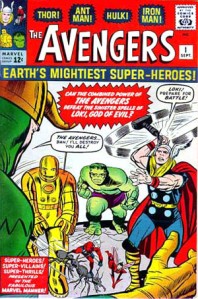
The Avengers #1. Credit: Marvel Comics.
It will be interesting to see how the idea of cinematic universes evolves over the coming years to decades, especially with Marvel releasing a game-changing film in 2018 that promises to bring together nearly every superhero they’ve introduced in their film series so far. It will also be interesting to see how movie studios approach the creation and acquisition of other intellectual property to bring to the big screen, and if they keep their eyes on a single film, or thinking of ways to expand the story and characters to fill up several films for years to come.
Time will tell.
Wow. Great post! I hadn’t realized the interconnections of this concept? What is there to learn here from those who want to write for the movies? What is your takeaway from this? Is it getting harder and harder to launch an original idea?
LikeLike
I don’t think the implication is that all films need to have a built-in franchise potential, but I think it is something that should be in the back of a writer’s mind that this could happen. A lot of people feel that this trend is spelling out the end of Hollywood creativity, but in fact this trend could be a good thing as it means that writers (who work basically as freelancers) are being employed. I also think this trend, like other trends, will eventually phase out, and perhaps only studios like Marvel or DC/Warner Bros will continue on doing this as they are effective at creating these franchises and truly have that franchise potential in their intellectual property. I also don’t think this will make it harder for writer’s to create original scripts. These franchise movies are incredibly expensive to make, which means it is hard for a studio to crank out 6-7 of these a year. These films also make a lot of money and make it possible for studio so finance smaller or original projects. Film audiences will always want horror movies and mid-budget comedies and rom coms. I don’t think those types of films will ever be pushed away by these franchise films.
LikeLike
It’s definitely interesting that Marvel Studios single handily spurned on the era of reboots and film universes. Even within the Marvel universe, they’ve rebooted things like Spider-Man and The X-Men a couple times. This has proved effective for Marvel, but DC has been criticized quite a bit in their recent attempts in trying to copy this style. Personally, I think DC’s material translates better in their shows rather than the movies thus far. It’ll be interesting to see how much longer this trend continues.
LikeLike